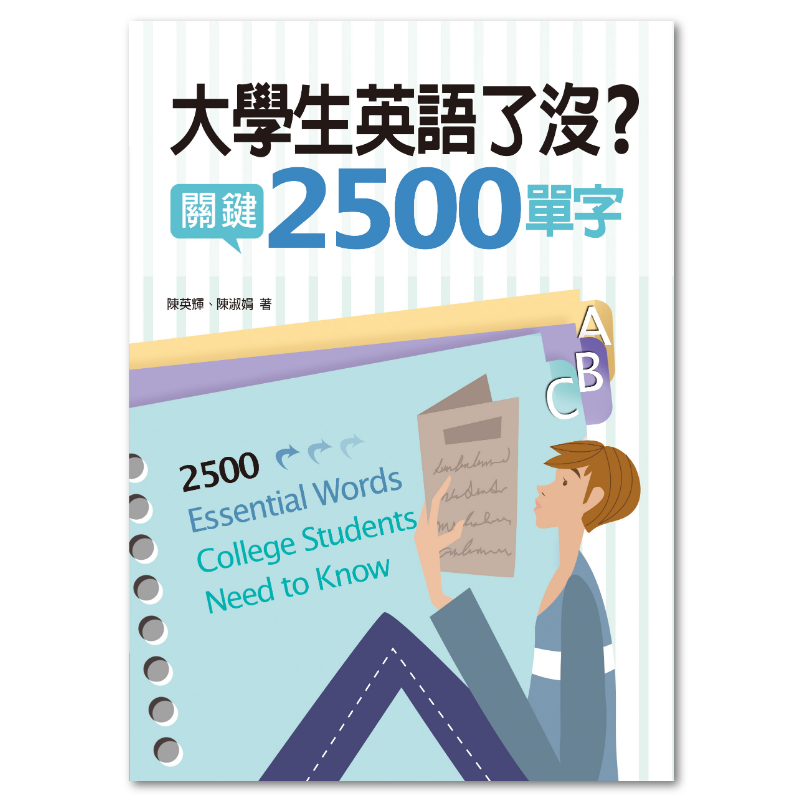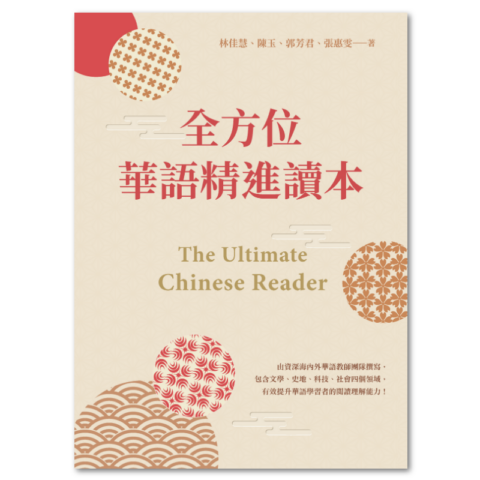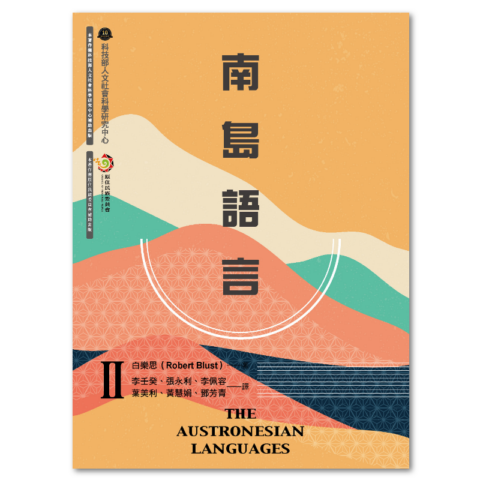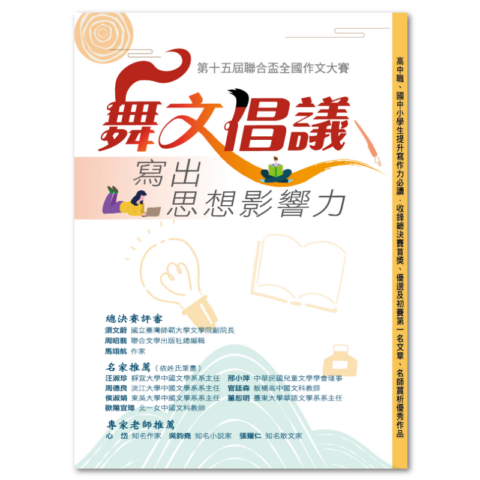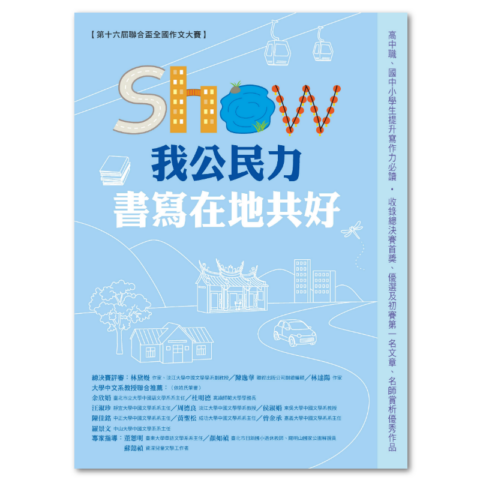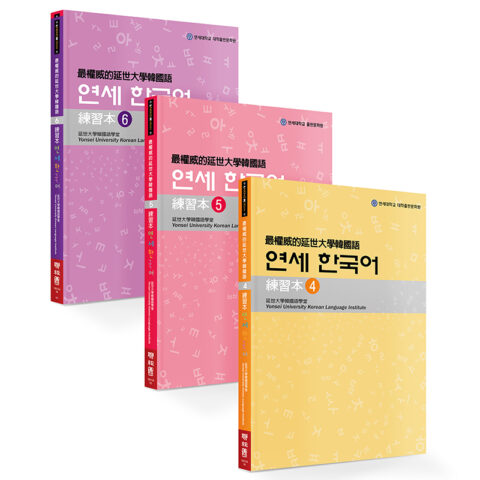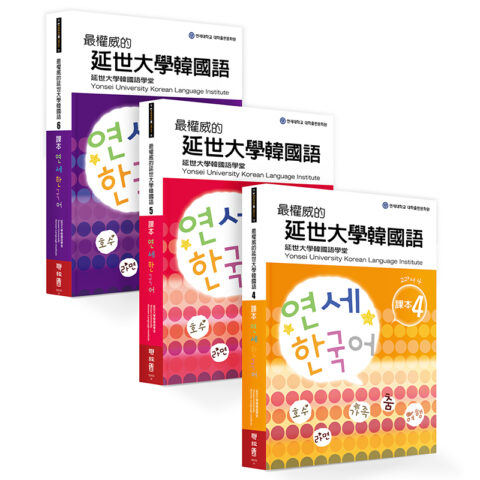大學生英語了沒?關鍵2500單字(附MP3)
出版日期:2013-11-07
作者:陳英輝、陳淑娟
印刷:雙色印刷
裝訂:平裝
頁數:448
開數:14.8×21cm
EAN:9789570842791
系列:Linking English
已售完
你具備大學生的基本單字程度了嗎?
大學生關鍵 2500 單字
不僅校園生活必備
同時為進入職場做好準備
英文作業、研究報告、校園生活通通都要會的基礎單字,你不會不可!
已經會的單字,再認真看一次單字的正確用法
還不會的單字,趕快用心記起來
教育部公布了台灣學生在高中時期應累積約 7 千個英文單字,大學學測則需具備 4 千個單字,但是高中生進入了大學後,基本的閱讀能力與生活上的溝通就無大礙了嗎?許多大學生基本的 e-mail 書寫都覺得困難重重,更別提溝通與閱讀能力了。為什麼會有這樣的落差呢?原因在於高中畢業時應具備的 7 千個單字量,許多是屬於「認識」單字,本書挑選了目前大學生活情境中使用頻率最高,最可能運用的 2500 個單字,約佔高頻率 7 千 5 百個英文單字的三分之一,搭配學術領域的運用,重現這些「製造」單字的活用性,強化大學生在生活上與學術上,以及未來職場上必備的字彙能力!
作者:陳英輝
現任:
亞洲大學語文教學研究發展中心 / 外國語文學系主任
台灣專業英語文學會理事長
美國TESOL ESPIS會長
學歷:
美國馬里蘭大學英美文學博士
國立台灣大學外文研究所碩士
國立臺灣師範大學英語系學士
近年著作:
《New TOEIC 新多益 10 大情境單字》
Ready to Go 系列教材 (Starter, I, II, III) (書林)
《維多利亞文學風貌:小說、詩歌及散文作家群像》(書林)
English for Hospitality & Tourism (AMC Publishing)
Presentation Skills & Language (Lynx Publishing)
The Joy of Literature (書林)
作者:陳淑娟
現任:
亞洲大學外國語文學系助理教授
亞洲大學語文教學研究發展中心主任
學歷:
輔仁大學比較文學博士
成功大學藝術研究所碩士
輔仁大學英國語文學系/圖書資訊學系雙學士
研究專長:
比較文學、亞美文學、第三世界女性文學、性別與族裔文化/文學研究、文學與藝術、視覺影像藝術研究
近期著作:
Marginality and Identity: Reconstruct the other in Visual Culture (冠唐)
前言
A
B
C
D
E
F
G
H
I
J
K
L
M
N
O
P
Q
R
S
T
U
V
W
XYZ
前言
就使用的角度而言,英文單字略可分成兩大類:認識類或被動類(recognition or passive vocabulary)與製造類或活用類(production or active vocabulary)。認識類的單字,顧名思義,僅停留於學習者的認知層面,無法實際應用於生活、職場或學術上;製造類的單字化被動為主動,學習者將其內化據為己有,隨時能在適合的情境派上用場。
依據教育部公佈的資訊,台灣學生在高中時期累積約 7 千個英文單字量,大學學測以 4 千個單字量為主,大學指考則要求高中畢業生應有的 7 千個單字。照理說,高中生進入大學時,基本的閱讀能力與生活上的溝通應無大礙,事實則不然。許多大學生書寫基本的電子書信(email)覺得困難重重,更遑論溝通與閱讀能力。究其主因,高中畢業時應具備的7千個單字量,許多是屬於「認識」單字,生活上用不著,所以無法加以活用。因此,本書編寫的初衷,主要是挑選目前大學生活情境中使用頻率最高,最可能派上用場的 2500個 單字,約佔高頻率(high-frequency)7 千 5 百個英文單字的三分之一,搭配學術領域的運用,重現這些「製造」單字的活用性,強化大學生在生活上與學術上必備的字彙能力。
學好英文,除了掌握文法,遣詞用字和句子結構外,增強字彙量絕對是第一要務。單字是學好英文的基本功,如同蓋大樓要先奠基一樣,好的基處是成功的保證。然而,聽起來很簡單的道理,卻因為學習內容不當,扼殺了許多年輕學子的英文夢。本書的出版主要在喚起學習者的記憶,將高中的7千個單字量轉換成最實用的2500單字,活用單字是掌握單字學習的第一步!冀望透過嚴格的過濾,學習者能在短時間內化書中全部的單字,使之成為生活上、校園裡的溝通利器。
當然,每個人因為不同的目的,對字彙量也有差別的需求,例如要閱讀《新聞周刊》(Newsweek)或《經濟學人》 (Economist) 等刊物,大約要有3-4萬個單字量,方能享受吸取知識的樂趣;如要閱讀大學英文教科書,因為專業術語的關係,至少要有2萬個單字量;要看懂一般雜誌或大眾小說大約需要1萬5千個單字。要學習的單字量多寡,取決於個人的需要,越專業,需要的單字量越多。然日常生活口語(spoken)或書寫(written)的溝通,只需具備本書的字彙量,就足以應付一般的溝通需求。
熟記單字至少需要兩項要訣:聽讀與句子脈絡。本書中的例句一來可輔助學習者理解單子的詞性與正確用法,二來可拓展學習者閱讀文本的廣度,符合所謂「置單字於句中脈絡學」(Learn a word in a context)的字彙學習策略;再者,藉由 MP3 中 native speaker的正確發音與單字音節,可刺激學習者腦中的記憶體,強化單字聯想(association) 的功能,達到事半功倍的成效。
亞洲大學語文教學研究發展中心主任 陳英輝
account
ac • count n. ( pl. accounts) 帳戶;帳單;說明 v. 說明;解釋 (for)
New foreign students were required to open bank accounts on campus.
Can you account for your behavior at the party last night?
adequate
ad • e • quate adj. 足夠的;充分的;適當的
We didn’t have adequate funding to complete the whole project.
The new house is just adequate for our family.
cease
cease v. 停止;結束;終止
The factory has ceased production.
The troops have been ordered to cease fire.
commence
com • mence v. 開始;著手
Students were preparing for their final exams, which were to commence in a week.
The war commenced in 1914.
extensive
ex • ten • sive adj. 廣闊的;廣泛的
His knowledge is extensive.
The fire caused extensive damage to the island’s forests.
genuine
gen • u • ine adj. 真的;真實的;不造作的
The medal is genuine gold.
He thanked her with genuine affection.
hesitate
hes • i • tate v. 躊躇;猶豫
If you have further questions, don’t hesitate to contact me.
He did not hesitate to ask her to marry him.
incentive
in • cen • tive n. ( pl. incentives) 誘因;獎勵
The government decided to offer incentives to help young people get hired.
What kind of incentive did you offer to make them work harder?
legitimate
le • git • i • mate adj. 合法的
Stopping this legitimate practice is going to be difficult.
The people’s concern for the political reform in question is legitimate.
margin
mar • gin n. ( pl. margins) 邊;邊沿;頁邊;幅度;餘量
I used to make notes in the margins of my books.
The President won the election by a narrow margin.
notable
no • ta • ble adj. 值得注意的;顯著的;出名的
I met a notable writer yesterday.
There is a notable difference between her on-screen and off-screen personalities.
oppose
op • pose v. 反對;反抗;妨礙
Local residents will strongly oppose the new urban plan.
They bitterly oppose this charity campaign.
practical
prac • ti • cal adj. 實踐的;實際的;實用的;有實用價值的
He’s a very practical person; perhaps the most sensible person I’ve ever met.
Practical experience is often very important in doing a job well.
relevance
rel • e • vance n. 關聯;相關;適宜
Your argument seems to have no relevance to the issue in question.
The course has some relevance to contemporary painting.
specialize
spe • cial • ize v. 專攻;專門從事;使專門化;使特殊化
He wanted his daughter to specialize in political science.
This company specializes in international trade.
temporary
tem • po • rar • y adj. 臨時的;短暫的 n. 臨時工;臨時房屋
All I can find is a temporary job.
He worked in the factory as a temporary.
withdrawal
with • draw • al n. 收回;撤回;撤退;提款
The government is negotiating the withdrawal of 10,000 troops.
You can make a withdrawal from any ATM
